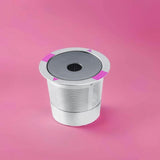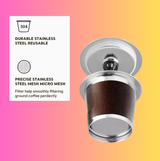Supports a Healthy Belly with Prebiotics
Jitter-Free Energy
Supports Hormonal Balance
Top 8 Allergen-Free
No Fillers or Fake Flavors
Tasting Notes
Brew your perfect cup every time with this eco-friendly, reusable stainless steel coffee pod, designed to fit most single-serve brewing machines, including Keurig®. Crafted from durable stainless steel, this pod is built to last and is easy to fill, clean, and reuse—saving you money while reducing waste. The fine mesh ensures a smooth, full-bodied brew without sediment, and it’s compatible with your favorite ground coffee or tea blends. Enjoy a sustainable and customizable brewing experience, all in a sleek, dishwasher-safe design.

As seen on
Shark Tank

“This is so GOOD!”
As seen in
How to brew
Sunrise (or Sunset) measure whenever you want 2 tsps per 8oz of water
Steep in the coffee or tea maker of your choice for 3 minutes
Sip your new fave routine!
Caffeine free
non-acidic
unsweetened
gluten free
keto-certified
AIP-friendly
source of prebiotics
eco-friendly




